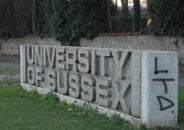The management at the University of Sussex in Brighton is attempting
to restructure the entire academic institution to make it fit for ‘the market’. The proposed ‘reforms’, which would change
the entire culture and tradition of the university, are part of a broader
process that is currently taking place in higher education in Britain and
around the world: the marketisation and privatization of education as part of the
governments’ neo-liberal policies.
The new Vice President of the University of Sussex as well as the
relatively new managers, want to – once again – restructure the university, only
five years after its last major reform. The University management’s strategic plan
– the so-called Green Paper – lays out the proposed changes for the upcoming
seven years. In short, the ‘reforms’,
which are based on a clear political agenda, have a very simple aim: they aim
to make the university into a business-run institution, with students as
consumers and education as a product.
Furthermore, research projects directed by faculty and students will in
future only be supported if they are conducive to the agenda of the government and
if they can present a tangible and measurable outcome. For example, research
projects in international security, which can benefit the government in its
international policies, will generally be financially funded. In addition, with the new changes, academics
will be subjected to managerial power over their department and over their
teaching – the heads of the departments shall, in the future, no longer be
academics, but highly skilled managers who have no tie to academia. These people are considered fitter to
administer the finances of the research projects and the department.
The University of Sussex, which is known for its critical attitude
towards society and which aims to give students an alternative education, is on
the verge of being changed into a business school. The management aims to build a new business department, which
should draw students from around the world to the institution. It is well-known that business schools
attract big money from governments and corporations alike. For the University of Sussex, which is already
poorly funded, this is a very attractive option.
But the sacrifice for the proposed
changes comes at a high price; academic freedom as well as receiving a critical
education are threatened to be forfeited. If the changes are implemented, another university in England will become
the victim of the market. Students will
receive an education which will discipline them and make them uncritical towards
society – in short, after attending university, they will be fit for the
capitalist workplace and for nothing else, or so it is intended.
The
students and staff of the university are trying to oppose these reforms. Weekly meetings which aim to halt the
restructuring process are taking place. At this point, it is absolutely crucial that the student body is led by
politically conscious leaders and that it is educated so as to become politically
conscious. It is important that this
student struggle is linked up with the struggle of the working class.
A fully funded and fully comprehensive education system under local democratic control.
Keep big business out of our schools and colleges. Free access for all
to further and higher education. Scrap tuition fees. No to student
loans. For a living grant for all over 16 in education or training.
See also:
Edinburgh – Schools Under Threat
By Ewan Gibbs Thursday, 10 January 2008
What is a university degree worth?
By a student comrade, 29 October 2007
Student Debt reaches all-time high – Socialist policies only way out
By Pat MacDonald (U.E.A Socialist Society) Thursday, 04 October 2007
The City Academy Scandal
By Ed Doveton (Oldham NUT personal capacity) Wednesday, 15 August 2007






